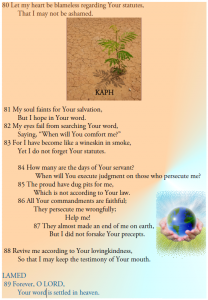 There are only three verses that contain questions in all of Psalm 119. The first, verse nine, is purely rhetorical–the psalmist asks the question in order to give the answer. The questions of verses 82 and 84 are quite different. Although there is an element of the rhetorical here (How many are the days of your servant? Not very many at all, is the clear implication), the psalmist’s principal questions are ones he craves answers for: “When will you comfort me? When will you punish my enemies? How long are you going to wait, Lord?”
There are only three verses that contain questions in all of Psalm 119. The first, verse nine, is purely rhetorical–the psalmist asks the question in order to give the answer. The questions of verses 82 and 84 are quite different. Although there is an element of the rhetorical here (How many are the days of your servant? Not very many at all, is the clear implication), the psalmist’s principal questions are ones he craves answers for: “When will you comfort me? When will you punish my enemies? How long are you going to wait, Lord?”
The whole Kaph section is centered around this theme. The first three verses describe the distress of the psalmist; the next four show his persecutors to be the reason for his distress. As elsewhere throughout the psalm, the psalmist’s response to persecution is a deliberate turning to–or remaining in–God’s word.
The words “faints” and “fail” from the first two verses come from the same Hebrew verb; Dr. A. Cohen suggests that a good English equivalent would be “dying for.”
The image of a wineskin in smoke is one that has you don’t hear very much anymore. I, for one, can’t remember seeing an actual wineskin in smoke; but I would imagine that such a wineskin would feel impressively dried out, dangerously brittle, and generally past its prime. There are days when I could still use an image like that. Maybe we could bring it back.
“Looks like you’ve had a hard week, Luke. Are you going to make it? How do you feel?”
“Like a wineskin in smoke, friend; just like a wineskin in smoke.”
In the NKJV, this is the only occurrence of the word “testimony.” (In other verses, it’s always “testimonies.”) It’s also the only occurrence of “so that,” rather than simply “that.”
Image courtesy of numanzaa/FreeDigitalPhotos.net
